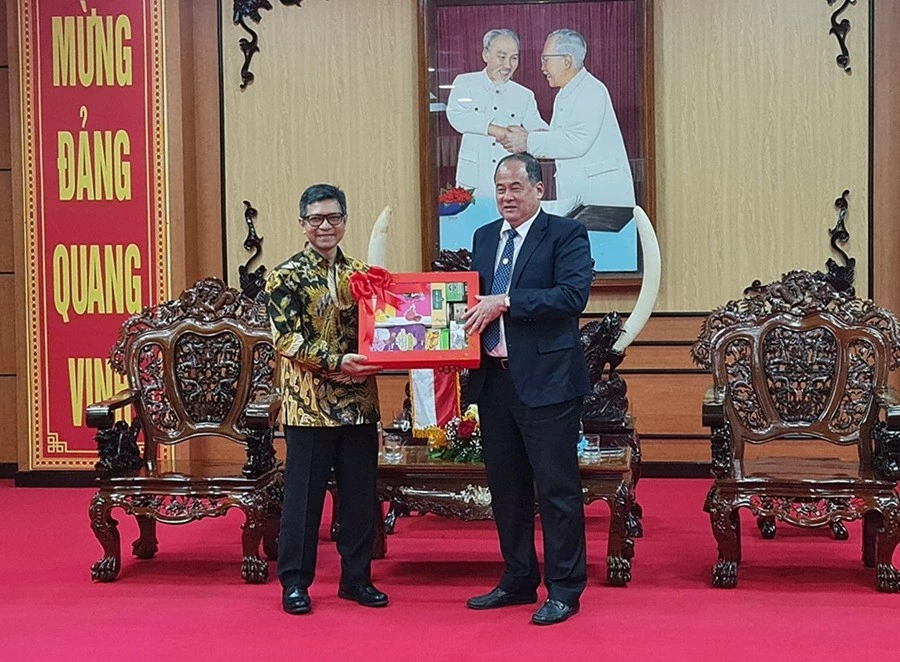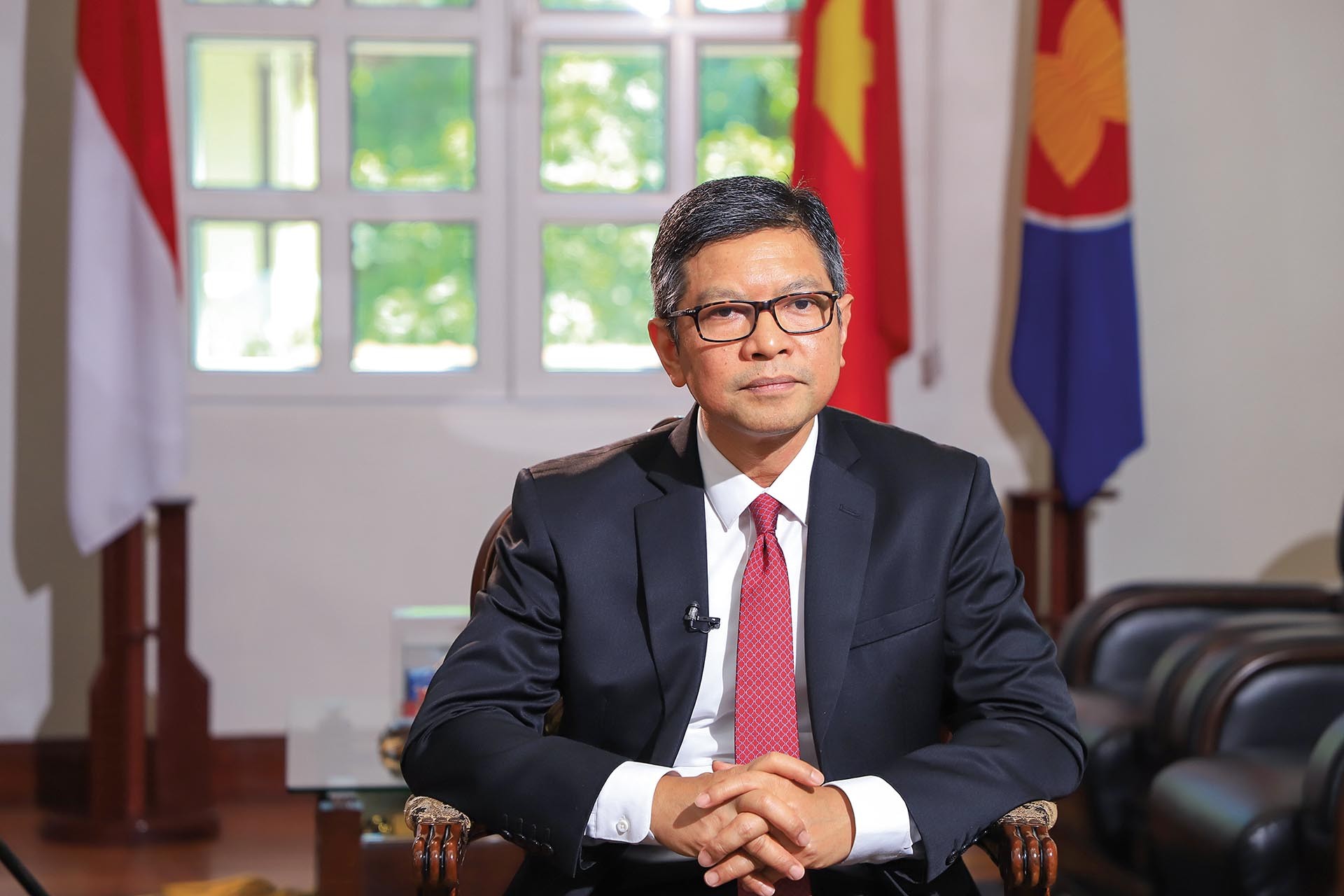
'Halal is more than just an industry, it is a way of life': Indonesian Ambassador
Latest
 |
| Indonesian Ambassador to Vietnam Denny Abdi worked in An Giang - a province with great potentials for the Halal industry in July 2023. (Source: An Giang Online) |
How do you evaluate the prospects for developing Vietnam’s Halal Industry?
The Halal market is expected to reach 15 trillion USD in 2050. Vietnam has a solid foundation as well as a large potential to tap on this market. Through a focus on research and innovation as well as on developing high-value added products, today Vietnam has become a competitive economy, and one of the world’s largest exporters.
Many businesses believe Halal certification is the key for Vietnamese industries to increase penetration to the Halal market.
 |
| Indonesian Ambassador to Vietnam Denny Abdi. (Photo: TH) |
However, this perspective is not complete, the Halal industry is beyond Halal certification. For Muslims around the world, Halal is more than just an industry, it is a way of life. A product that is declared Halal must follow Halal guidelines in every part of its production.
Furthermore it should also take into consideration amongst others: its quality, sustainability, environmental impacts, hygiene and effects towards health. Halal also applies in various sectors, not just food and beverage, but also fashion, cosmetics, pharmaceuticals, tourism, media - recreation and financial services.
With a solid manufacturing industry, strong commitments, and the eagerness to understand the Halal industry, the prospect for Vietnam is bright.
What are the potentials for cooperation between Vietnam and Indonesia in the Halal Industry? Could you share plans of the Embassy to push the cooperations in this field?
As one of the countries with the largest Muslim populations in the world, Indonesia already has an established Halal industry and market. Products sold in the market are already reviewed and labeled according to the evaluation by the Halal authorities.
In this context, cooperation between Indonesia and Vietnam can start from sharing expertise and know-hows. Indonesia has the experience in developing Halal products and in incorporating Islamic regulations into the industry. Hence there are vast potentials for both countries to collaborate and complement each other.
In the Embassy, our main task is to promote cooperation between the two countries in various sectors. In the context of Halal, it has to be reiterated that cooperation should not only focus on economic aspects, but also various other aspects, including social and cultural aspects.
The Indonesian Embassy have supported various Muslim communities’ activities in Vietnam, from communities in Hanoi, to as far as Vietnam’s Muslim Community in An Giang Province. We believe that our efforts will strengthen the connection between Muslim communities in Vietnam and Indonesia. And in turn, we hope this will promote collaboration in the development of Halal industries.
Specifically on the Halal Industry, we also continuously promote businesses to collaborate in producing halal products, and policymakers to cooperate in setting the regulations and facilitating the two countries.
What are your advices for Vietnamese businesses that want to promote the export of products with Halal standards?
It has to be reiterated that Vietnamese businesses must understand that Halal is not just an industry, but is a way of life for Muslims. To do this, a deep understanding on the Halal way of life is imperative.
As such, we have several initial suggestions, not only for Vietnamese businesses, but also the Government, educational institutions, and other stakeholders in Vietnam to make the first few steps in developing the Halal industry.
First, Vietnam must make use of its Muslim communities and ensure their active role in the development of the Halal industry. A good Halal industry can only be built through a strong Islamic community. These communities have the knowledge to promote the development of the Halal industry, not only as advisors but also as actors.
As Muslims around the world have a shared perspective and understanding, these communities can connect Vietnam with to learn and share experiences with other countries more experienced in the Halal way of life. This can range from training, student exchanges, collaboration with Muslim businesses, and even joint research. For example, universities can send students to Indonesian universities to conduct a research on the Halal industry in Indonesia. In short, strengthen collaboration with experts and counterparts from around the globe to create a solid understanding on Halal.
Vietnam also need to develop its own government-incorporated Halal agencies to promote cooperation with other countries, test and evaluate products, as well as present halal certificates.
With such pillars in place, Vietnam will not only be able to export its products to Muslim countries for international consumption, but also able to provide Halal products for its national consumption. This will entail into more Muslim foreign visitors travelling to Viet Nam, including visitors from Indonesia.
With Indonesia’s Halal market, what are the opportunities for Vietnam and issues that Vietnamese businesses need to pay attention?
As a Muslim-majority country, Indonesia already has an established and thriving Halal industry. In this sense, the two countries should not compete to create its own Halal products. Instead, Vietnam and Indonesia can collaborate, develop joint ventures, or promote investment to co-produce Halal products.
Given Indonesia’s experience and expertise in the Halal industry, the two countries can complement each other according to its strengths and promote the development of a regional Halal supply chain.
With this, Muslims around the world will have access to more Halal products, including those produced by Vietnam.





















